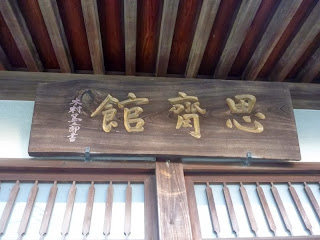2013 Japan trip report
First, I landed in Ikebukuro, one of the inner 'suburbs' of Tokyo. Khay-Lin Teoh sensei from Fudoshin Kendo Club and I were both staying in the same ryokan (Japanese-style inn).
Here is K-L sensei standing out front of the Nippon Budokan, venue for the grading.
Both K-L sensei and I had been for 6th dan in Japan before, so we weren't as nervous this time.
Warm-ups happen wherever you can find space, either in the back corridors...
...or in the main stadium itself. The morning session was for candidates under the age of 45. A similar number started arriving later for the afternoon session over 45 years and over. The whole day was just for 6th dan, and the 8 grading panels would have judged well over 1000 kenshi by the end of the day: another reason why 8th dans are amazing.
Upon arrival you have to find your grading area which is based on your birthday. Tip: you need to know your date of birth in Japanese years! Then you get your registration card.
The organisers then work out who has actually turned up for the grading and assign grading numbers. One of the hard-working volunteers (students from Nittaidai—National Sports Science Univ) then calls out your name and you get your official number.
Here you can see I have my number and the gradings have started in the background. It gets pretty noisy! And they plough through the candidates pretty quickly. My number shows that I was on grading court no. 6, group number 27, candidate A. If you assume that each court had 27 groups, you can work out roughly the total number of candidates in the morning session: 4 x 27 x 8 = 864.
K-L sensei was in my group because his birthday and mine are close together. The organisers very thoughtfully made him candidate C, meaning we didn't have to fight each other. Each candidate fights twice: A plays B, B plays C, C plays D, D plays A. This means that fought in the first and last matches. I also got to watch K-L sensei fight both of his. In the end, only candidate 627D passed in our group. I felt that I did much better than last time, and I have resolved to try again.
Here is a view of the eight grading areas in action.
Afterwards it was necessary to repair to an izakaya (Japanese tapas bar) in Yurakucho for debriefing...
The next day sight-seeing around the Imperial Palace. Gingko trees still with beautiful autumn leaves. I actually had roasted gingko nuts the previous night: they're like a cross between chestnuts and jelly beans.
The walls and moat of the Imperial Palace.
Kimono at National Crafts Museum
Tea bowl at National Crafts Museum. Next day, on to Kanagawa Prefecture to visit the gentleman in the middle...

On the left is Takizawa sensei's dojo, the Shiseikan, in the middle his new Lexus Hybrid, and behind, his house. Nice!
Takizawa-s. visits Spain a lot, but he also has a very international focus, and he teaches his students about the world as well as Kendo.
They also do pretty well in shiai...
In Takizawa-sensei's office a photo of his mother, with his 8th dan certificate on the left, and his father's 9th dan certificate on the right.
They do a lot of kata at the Shiseikan, not just Kendo Kata but also Nakanishi-ha Itto Ryu.
This is the nafuda-kake, or dojo membership board. According to this, the dojo has (or had) twenty-one 7th dans!
It was great to see Takizawa-s. emphasising left-hand only suburi! He also has a range of really cool training drills which I noted down and will introduce to our training next year.
I took around 40 Nanseikan badges to give to the junior members. Lucky I took so many as there was only just enough, and they loved them.
Mrs Takizawa also helped out with the junior group, helping with tying men-himo and so on. She doesn't seem to do Kendo herself though. I must say that even the youngest member, who is 5, can tie his own men. I will upload video of the little ones putting on men to shame some of you into practicing a bit harder!
And here he is, the littlest one.




























Comments
Post a Comment